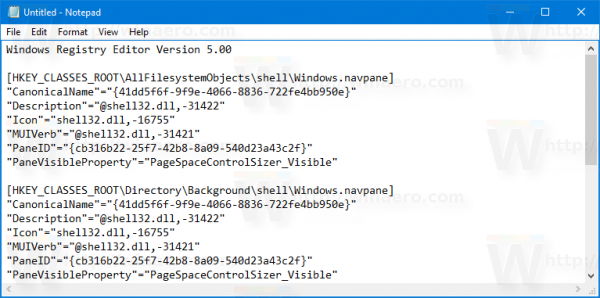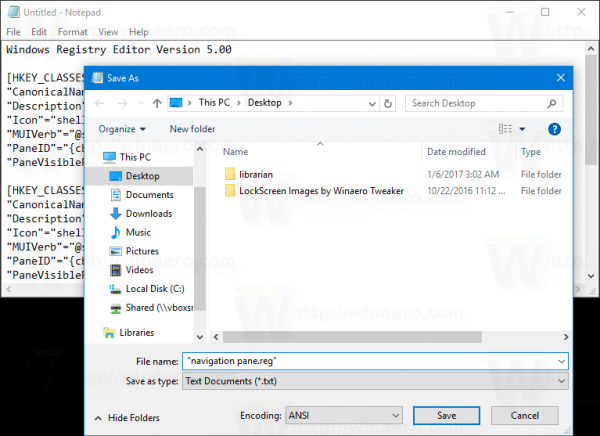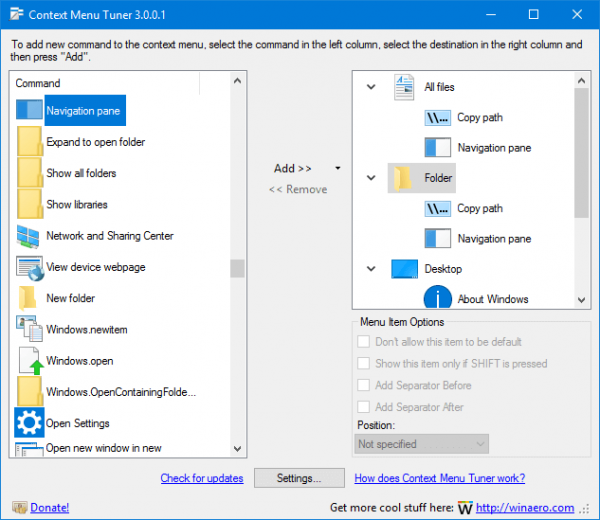Today, we will see how to add the Navigation Pane to the context menu in Windows 10. This will allow you to toggle the Navigation pane in File Explorer directly with one click.
Advertisеment
The Navigation pane is a special area on the left of File Explorer which shows the folders and system places like This PC, Network, Libraries and so on. The user is not allowed to customize the Navigation Pane because the user interface lacks the required options, but this is possible with a hack. See this article:
Add custom folders or Control Panel applets to Navigation Pane in File Explorer
It is possible to switch the visibility of the Navigation pane using the Ribbon. There is a special button on the View tab. If you add the Navigation Pane context menu command, you can toggle it faster by right-clicking in an empty area of a folder without opening the Ribbon or switching its tabs. Here is how the context menu looks: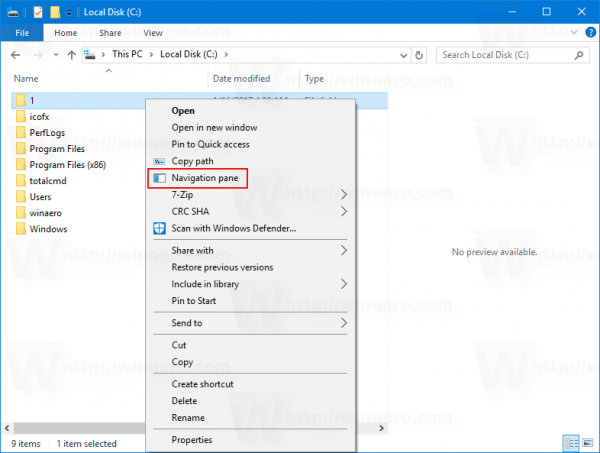
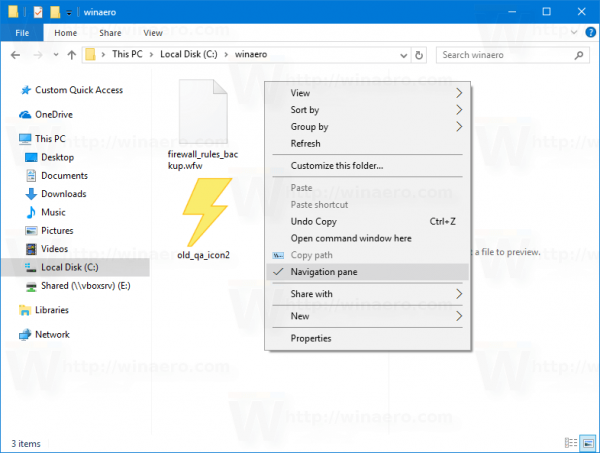
To Add Navigation Pane Context Menu in Windows 10, do the following.
Apply the Registry tweak listed below. Paste its contents inside Notepad and save as a *.reg file.
Windows Registry Editor Version 5.00
[HKEY_CLASSES_ROOT\AllFilesystemObjects\shell\Windows.navpane]
"CanonicalName"="{41dd5f6f-9f9e-4066-8836-722fe4bb950e}"
"Description"="@shell32.dll,-31422"
"Icon"="shell32.dll,-16755"
"MUIVerb"="@shell32.dll,-31421"
"PaneID"="{cb316b22-25f7-42b8-8a09-540d23a43c2f}"
"PaneVisibleProperty"="PageSpaceControlSizer_Visible"
[HKEY_CLASSES_ROOT\Directory\Background\shell\Windows.navpane]
"CanonicalName"="{41dd5f6f-9f9e-4066-8836-722fe4bb950e}"
"Description"="@shell32.dll,-31422"
"Icon"="shell32.dll,-16755"
"MUIVerb"="@shell32.dll,-31421"
"PaneID"="{cb316b22-25f7-42b8-8a09-540d23a43c2f}"
"PaneVisibleProperty"="PageSpaceControlSizer_Visible"
[HKEY_CLASSES_ROOT\Drive\shell\Windows.navpane]
"CanonicalName"="{41dd5f6f-9f9e-4066-8836-722fe4bb950e}"
"Description"="@shell32.dll,-31422"
"Icon"="shell32.dll,-16755"
"MUIVerb"="@shell32.dll,-31421"
"PaneID"="{cb316b22-25f7-42b8-8a09-540d23a43c2f}"
"PaneVisibleProperty"="PageSpaceControlSizer_Visible"
[HKEY_CLASSES_ROOT\LibraryFolder\Background\shell\Windows.navpane]
"CanonicalName"="{41dd5f6f-9f9e-4066-8836-722fe4bb950e}"
"Description"="@shell32.dll,-31422"
"Icon"="shell32.dll,-16755"
"MUIVerb"="@shell32.dll,-31421"
"PaneID"="{cb316b22-25f7-42b8-8a09-540d23a43c2f}"
"PaneVisibleProperty"="PageSpaceControlSizer_Visible"In Notepad, press Ctrl + S or execute the File - Save item from the File menu. This will open the Save dialog. There, type or copy-paste the name "navigation pane.reg" including quotes. Double quotes are important to ensure that the file will get the "*.reg" extension and not *.reg.txt. You can save the file to any desired location, for example, you can put it in your Desktop folder.
Double click the file you created, confirm the import operation and you are done!
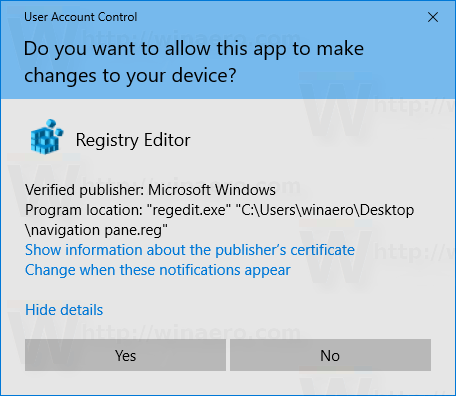
 To understand how this tweak works, refer to my previous article where I explained how to add any Ribbon command to the Context menu in Windows 10. See
To understand how this tweak works, refer to my previous article where I explained how to add any Ribbon command to the Context menu in Windows 10. See
How to add any Ribbon command to the right click menu in Windows 10
In short, all the Ribbon commands are stored under this Registry key
HKEY_LOCAL_MACHINE\SOFTWARE\Microsoft\Windows\CurrentVersion\Explorer\CommandStore\shell
You can export the desired command and modify the exported *.Reg in order to add it to the context menu of files, folders, or any other object visible in File Explorer.
To save your time, I made ready-to-use Registry files. You can download them here:
Alternatively, you can use Context Menu Tuner. It will allow you to add any Ribbon command to the context menu.
Select "Navigation pane" in the list of available commands, select "All Files" on the right side and click the "Add" button. See the screenshot above. Now, add the same command to Folder, Drive and Library. You can get the app here:
That's it.
Support us
Winaero greatly relies on your support. You can help the site keep bringing you interesting and useful content and software by using these options:
